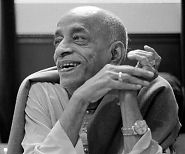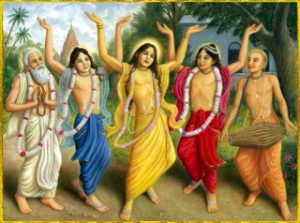The 9th chapter of the first Canto of Srimad Bhagavatam–The passing away of Mahajana Bhisma Deva and his valuable instructions for mankind
SB 1.9.12 purport–Mahārāja Yudhiṣṭhira was disturbed due to the great massacre in the Battle of Kurukṣetra. Bhīṣmadeva could understand this, and therefore he spoke first of the terrible sufferings of Mahārāja Yudhiṣṭhira. He was put into difficulty by injustice only, and the Battle of Kurukṣetra was fought just to counteract this injustice. Therefore, he should not regret the great massacre. He wanted to point out particularly that they were always protected by the brāhmaṇas, the Lord and religious principles. As long as they were protected by these three important items, there was no cause of disappointment. Thus Bhīṣmadeva encouraged Mahārāja Yudhiṣṭhira to dissipate his despondency. As long as a person is fully in cooperation with the wishes of the Lord, guided by the bona fide brāhmaṇas and Vaiṣṇavas and strictly following religious principles, one has no cause for despondency, however trying the circumstances of life.Bhīṣmadeva, as one of the authorities in the line, wanted to impress this point upon the Pāṇḍavas.
SB 1.9.14 purport- Even the most pious has to suffer the condition of material nature. But a pious man is faithful to the Lord, for he is guided by the bona fide brāhmaṇa and Vaiṣṇava following the religious principles. These three guiding principles should be the aim of life. One should not be disturbed by the tricks of eternal time. Even the great controller of the universe, Brahmājī, is also under the control of that time; therefore, one should not grudge being thus controlled by time despite being a true follower of religious principles.
SB 1.9.15 purport…..Spiritually the King himself was the symbol of religion, and above all of them the Personality of Godhead, Lord Śrī Kṛṣṇa, was personally concerned with their affairs as the well-wisher. And yet there were so many reverses on the side of the Pāṇḍavas. Despite the power of pious acts, the power of personalities, the power of expert management and the power of weapons under the direct supervision of Lord Kṛṣṇa, the Pāṇḍavas suffered so many practical reverses, which can only be explained as due to the influence of kāla, inevitable time. Kāla is identical with the Lord Himself, and therefore the influence of kāla indicates the inexplicable wish of the Lord Himself. There is nothing to be lamented when a matter is beyond the control of any human being.
SB 1.9.16—O King, no one can know the plan of the Lord [Śrī Kṛṣṇa]. Even though great philosophers inquire exhaustively, they are bewildered.
PURPORT-The bewilderment of Mahārāja Yudhiṣṭhira over his past sinful acts and the resultant sufferings, etc., is completely negated by the great authority Bhīṣma (one of the twelve authorized persons). Bhīṣma wanted to impress upon Mahārāja Yudhiṣṭhira that since time immemorial no one, including such demigods as Śiva and Brahmā, could ascertain the real plan of the Lord. So what can we understand about it? It is useless also to inquire about it. … The Lord had to execute the plan of establishing the kingdom of virtue, and therefore His own devotees suffered temporarily in order to establish the conquest of virtue.
SB 1.9.18 purport-…Whenever, therefore, a show is made to teach the devotee, as in the case of the teachings of Bhagavad-gītā, it is for teaching the less intelligent men. A devotee’s duty, therefore, is to ungrudgingly accept tribulations from the Lord as a benediction.
SB 1.9.22 purport- …Having unflinching faith in the Supreme Lord as one’s protector, friend and master is the natural condition of eternal life. A living entity is so made by the will of the Almighty that he is most happy when placing himself in a condition of absolute dependence.
The opposite tendency is the cause of falldown. The living entity has this tendency of falling down by dint of misidentifying himself as fully independent to lord it over the material world. The root cause of all troubles is there in false egotism. One must draw towards the Lord in all circumstances.
…The best way to establish our relation in transcendental sweetness is to approach Him through His recognized devotees. One should not try to establish the relation directly; there must be a via medium which is transparent and competent to lead us to the right path.
SB 1.9.25 purport-…Lord Śrī Kṛṣṇa inspired Mahārāja Yudhiṣṭhira to ask Bhīṣmadeva in the presence of many great sages, indicating thereby that the Lord’s devotee like Bhīṣmadeva, although apparently living as a worldly man, is far superior to many great sages, even Vyāsadeva. Another point is that Bhīṣmadeva at that time was not only lying on a deathbed of arrows, but was greatly aggrieved because of that state. One should not have asked him any question at that time, but Lord Śrī Kṛṣṇa wanted to prove that His pure devotees are always sound in body and mind by dint of spiritual enlightenment, and thus in any circumstances a devotee of the Lord is in perfect order to speak of the right way of life.
SB 1.9.26 purport-….Bhīṣmadeva advised for all human beings nine qualifications: (1) not to become angry, (2) not to lie, (3) to equally distribute wealth, (4) to forgive, (5) to beget children only by one’s legitimate wife, (6) to be pure in mind and hygienic in body, (7) not to be inimical toward anyone, (8) to be simple, and (9) to support servants or subordinates. One cannot be called a civilized person without acquiring the above-mentioned preliminary qualities. Besides these, the brāhmaṇas (the intelligent men), the administrative men, the mercantile community and the laborer class must acquire special qualities in terms of occupational duties mentioned in all the Vedic scriptures. For the intelligent men, controlling the senses is the most essential qualification. It is the basis of morality. Sex indulgence even with a legitimate wife must also be controlled, and thereby family control will automatically follow.
…The kṣatriya, the member of the administrative class, is especially advised to give charity and not to accept charity in any circumstances. Modern administrators raise subscriptions for some political functions, but never give charity to the citizens in any state function. It is just the reverse in the injunctions of the śāstras….In fighting, the king or the president should never return home without being hurt by the enemy. The so-called king of today never visits the warfield.
…The vaiśyas, the members of the mercantile communities, are especially advised to protect the cows. Cow protection means increasing the milk productions, namely curd and butter. Agriculture and distribution of the foodstuff are the primary duties of the mercantile community backed by education in Vedic knowledge and trained to give in charity.
The productive energy of the laborer is misused when he is occupied by industrial enterprises. Industry of various types cannot produce the essential needs of man, namely rice, wheat, grains, milk, fruits and vegetables. The production of machines and machine tools increases the artificial living fashion of a class of vested interests and keeps thousands of men in starvation and unrest. This should not be the standard of civilization.
…It is especially enjoined that a śūdra should never bank money. As soon as the śūdras accumulate wealth, it will be misused for sinful activities in wine, women and gambling. Wine, women and gambling indicate that the population is degraded to less than śūdra quality.
The varṇas are, so to speak, classifications of different occupations, and āśrama-dharma is gradual progress on the path of self-realization. Both are interrelated, and one is dependent on the other. The main purpose of āśrama-dharma is to awaken knowledge and detachment.
One who fails to assimilate this spirit of detachment is allowed to enter into family life with the same spirit of detachment. Therefore, one who attains detachment may at once adopt the fourth order, namely, renounced, and thus live on charity only, not to accumulate wealth, but just to keep body and soul together for ultimate realization. Household life is for one who is attached, and the vānaprastha and sannyāsa orders of life are for those who are detached from material life. The brahmacārī-āśrama is especially meant for training both the attached and detached.
SB 1.9.27 purport-…To give charity is one of the householder’s main functions, and he should be prepared to give in charity at least fifty percent of his hard-earned money.



